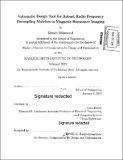Automatic design tool for robust radio frequency decoupling matrices in magnetic resonance imaging
Author(s)
Mahmood, Zohaib
DownloadFull printable version (4.543Mb)
Other Contributors
Massachusetts Institute of Technology. Computation for Design and Optimization Program.
Advisor
Luca Daniel.
Terms of use
Metadata
Show full item recordAbstract
In this thesis we study the design of robust decoupling matrices for coupled transmit radio frequency arrays used in magnetic resonance imaging (MRI). In a coupled parallel transmit array, because of the coupling itself, the power delivered to a channel is typically partially re-distributed to other channels. This power must then be dissipated in circulators resulting into a significant reduction in the power efficiency of the overall system. In this thesis, we propose an automated approach to design a robust decoupling matrix interfaced between the RF amplifiers and the coils. The decoupling matrix is optimized to ensure all forward power is delivered to the load. The decoupling condition dictates that the admittance matrix seen by power amplifiers with 50 Ohms output impedance is a diagonal matrix with matching 1 (or 0.02 Siemens) at the diagonal. Our tool computes the values of the decoupling matrix via a non linear optimization and generate a physical realization using reactive elements such as inductors and capacitors. The methods presented in this thesis scale to any arbitrary number of channels and can be readily applied to other coupled systems such as antenna arrays. Furthermore our tool computes parameterized dynamical models and performs sensitivity analysis with respect to patient head-size and head-position for MRI coils.
Description
Thesis: S.M., Massachusetts Institute of Technology, Computation for Design and Optimization Program, 2015. Cataloged from PDF version of thesis. Includes bibliographical references (pages 43-45).
Date issued
2015Department
Massachusetts Institute of Technology. Computation for Design and Optimization ProgramPublisher
Massachusetts Institute of Technology
Keywords
Computation for Design and Optimization Program.